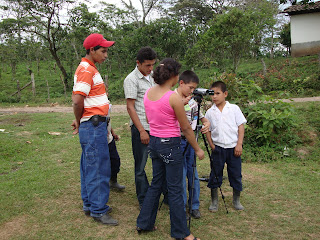Last Thursday I went to the village of Cementera where Caritas has a project on Community-based management of natural disasters. A team from El Salvador that is teaching the people how to make videos was having their second training day.
I’ve been to Cementera several times and know a few folks there, but this was different. Most of the twenty-some persons in the video production training are under twenty.
They had been divided into three teams to treat themes
 they chose – reforestation, the medicinal qualities of the orange tree, and preserving forest animals. It was amazing to watch them filming their community and trying to learn how to make short documentaries.
they chose – reforestation, the medicinal qualities of the orange tree, and preserving forest animals. It was amazing to watch them filming their community and trying to learn how to make short documentaries.One thing that struck me was the enthusiasm of a number of the young people including Erlin who has one year left to finish high school, the two brothers Miguel and Denis, and eight year old Lenin.
But I also noticed how timid some of the young people are, especially the girls, as well as how hard it was for some of them to answer some basic questions on what had been explained to them the day before. I attribute the former to the low self-esteem that many people in the countryside suffer from since the poor are often looked down upon. The difficulty to answer basic questions is, I believe, due to the inadequacies of the Honduras educational system, where memorization is the preferred method of teaching and where many young people don’t go past the sixth grade.
But this community disaster management project can help with many things - not just how to deal with disasters. It's helping them take charge of their lives and value their dignity.
But it is also not just a project from institutions outside; it touches some of the wisdom that comes from within the community. Anselmo, the oldest person taking part the workshop, mentioned how his father who never had a training session but said that they had to leave a certain group of trees untouched, because “tree give life.” The wisdom of the ancients – at times, lost – need to be recovered. Projects like this may help that process.
Intellectual discussions
One thing I have missed here is the opportunity for many stimulating intellectual discussions. I don’t have many. Partly this may be due to the limitations of my Spanish, but I also have not met many people who really like these types of discussions. (I had one today over lunch with a young grad student from the U.S. doing research in Copán Ruinas.)
But during the Catholic Social Teaching workshop I facilitated for people from the rural sector of the cathedral parish I had one of the best intellectual discussions I’ve had for a long time. We spent over an hour trying to understand what social sin is. It was, fro me, a profound experience of real intellectual dialogue. But here’s the most important part. Of the twelve participants in the workshop there was only one professional, a retired teacher. My guess is that most of the others had less than six years formal education.
But it was a great discussion and I learned a lot from them and their wisdom.
The wisdom of the poor!




No comments:
Post a Comment